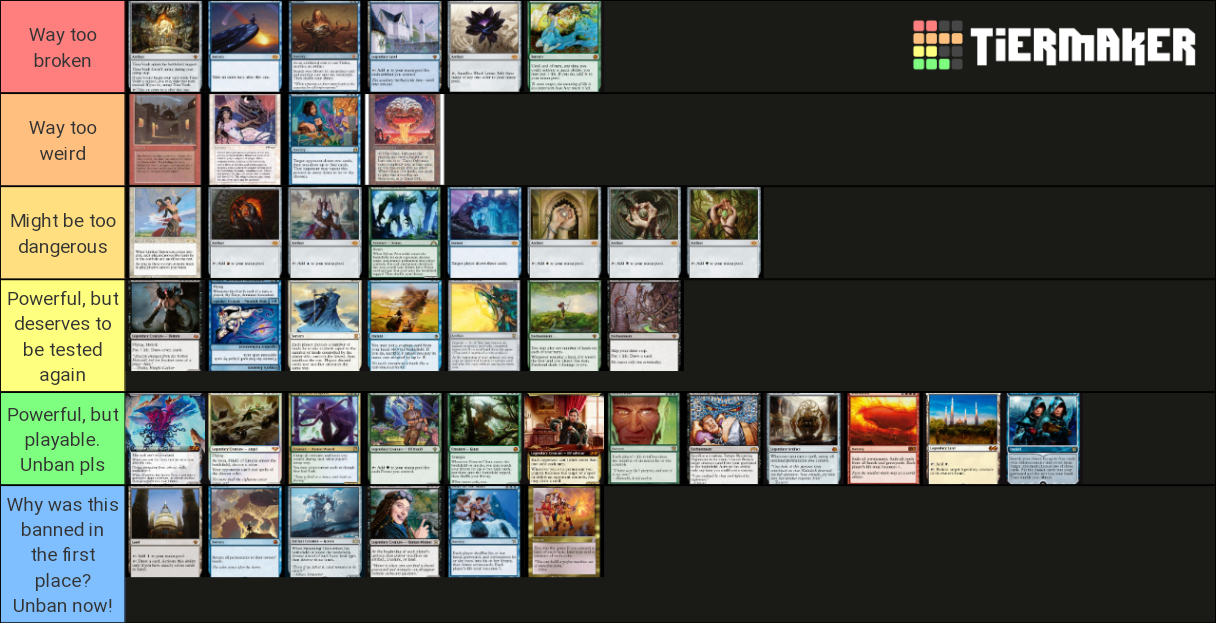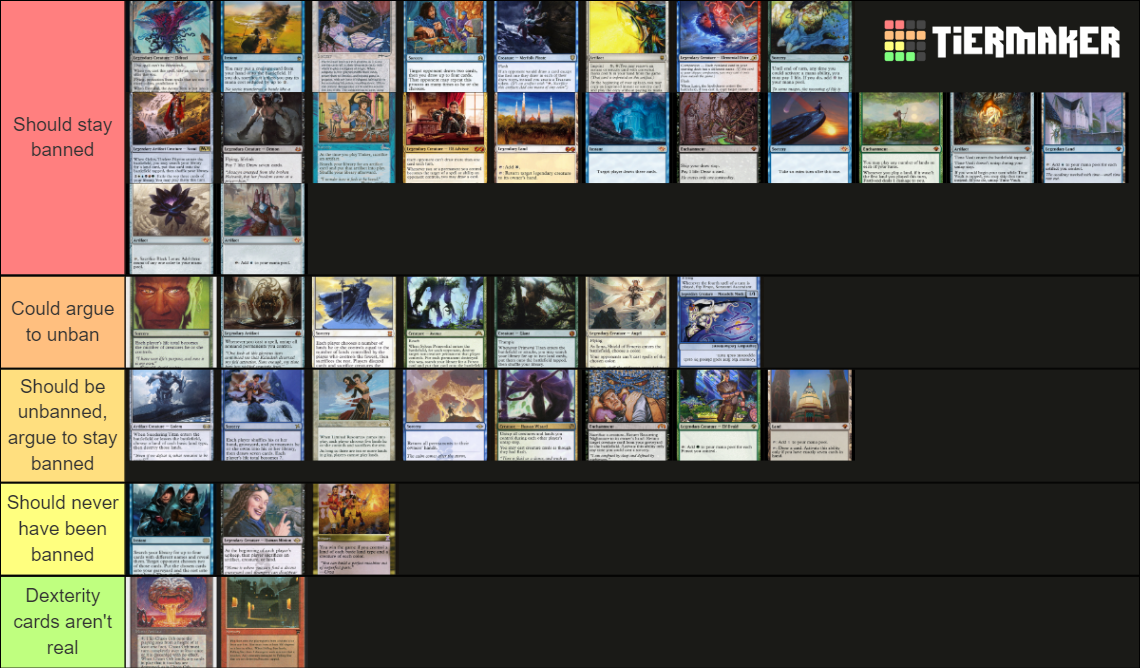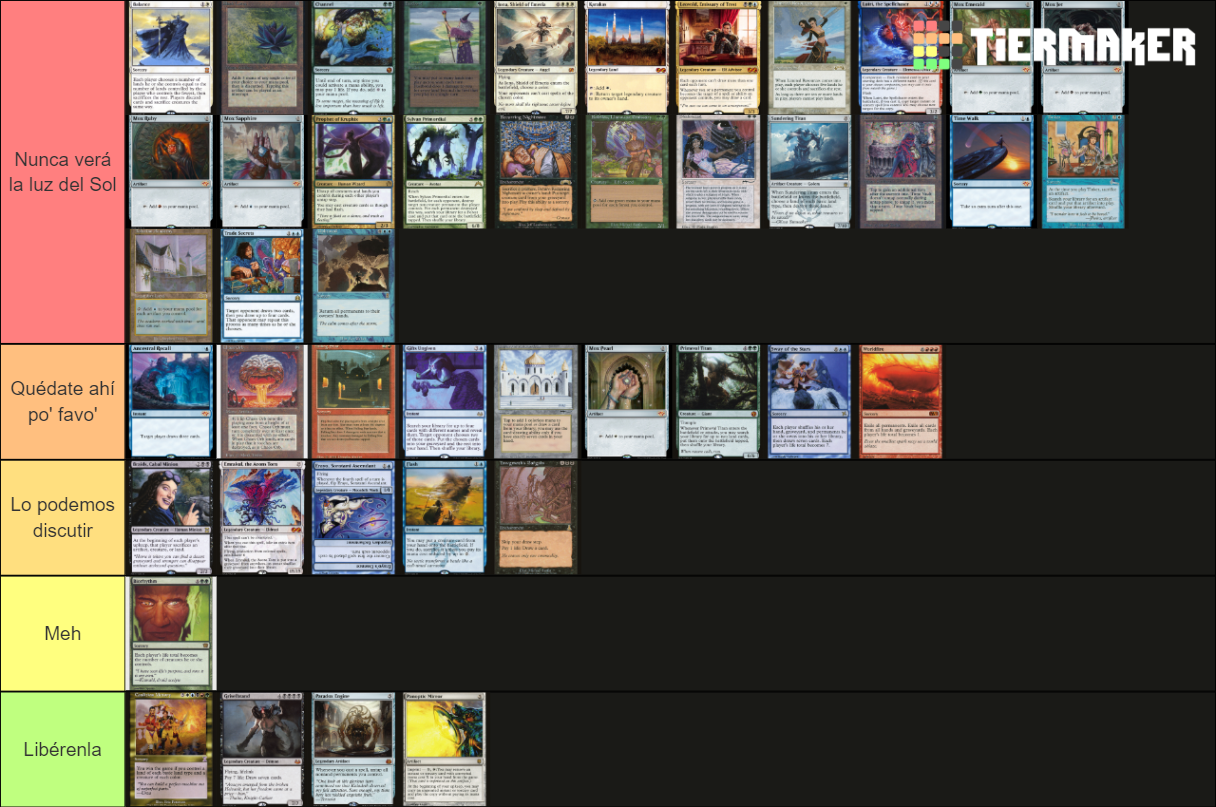The Shifting Sands Of The Commander Ban List
For many Magic: The Gathering enthusiasts, the **Commander ban list** is more than just a dry compilation of forbidden cards; it's a living document that shapes the very essence of their favorite format. It dictates which cards are not legal to play in Commander games without prior agreement from the other players, ensuring a balanced, creative, and enjoyable experience for everyone at the table. This list is a critical tool, meticulously maintained to safeguard the health and diversity of a format celebrated for its unique blend of social interaction and strategic depth.
The dynamic nature of Commander, with its ever-expanding card pool and evolving meta, necessitates a vigilant approach to card legality. As new sets are released and player strategies adapt, the governing bodies of the format must continually assess which cards might disrupt the delicate balance or foster undesirable play patterns. Understanding the philosophy behind these decisions, the specific cards affected, and the recent monumental shifts in the format's governance is key to truly appreciating the role of the ban list in Commander's ongoing evolution.
Table of Contents
- Understanding the Core Philosophy Behind the Commander Ban List
- The Evolution of Commander's Governance: A New Era of Ban List Management
- Navigating the Banned Cards: What's Off-Limits in Commander?
- The Dynamic Updates: When and How the Commander Ban List Changes
- The "Game Changers" List: A Testing Ground for Commander's Future
- The Unbanning Phenomenon: Bringing Cards Back into the Fold
- Commander's Unique Legal Landscape: Beyond the Ban List
Understanding the Core Philosophy Behind the Commander Ban List
At its heart, the philosophy of Commander prioritizes creativity, player expression, and a unique social gaming experience. Unlike competitive formats focused on efficiency and speed, Commander aims to foster a slower, more deliberate pace of game. This design choice is crucial because it gives decks time and space to develop, allowing players to execute diverse and often elaborate strategies that might not be viable in faster-paced environments. The **Commander ban list** is a direct reflection of this philosophy, acting as a safeguard against cards that would undermine these core tenets.
The goal is not to eliminate powerful cards entirely, but rather to prevent those that create overwhelmingly negative play patterns, lead to non-games, or stifle creativity by forcing all decks into a narrow competitive mold. Cards that promote an "arms race" mentality, where players feel compelled to include specific, often expensive, answers or risk being completely outmatched, are often scrutinized. The ban list ensures that players can bring their unique, often thematic, decks to the table without feeling pressured to conform to a hyper-optimized meta. It’s about preserving the format’s identity as a casual-first, social experience where diverse strategies can thrive. Ultimately, the cards on this list are deemed too disruptive to the intended play experience, and their inclusion without prior agreement from the other players in the game is strongly discouraged, as they may steer your playgroup to avoid other, similar cards.
The Evolution of Commander's Governance: A New Era of Ban List Management
The landscape of Commander's governance has undergone a monumental shift, particularly following a series of impactful decisions in late 2024 and early 2025. Historically, the format was overseen by the Commander Rules Committee (RC) and the Commander Advisory Group (CAG), a dedicated group of community members and prominent figures who stewarded the format's rules and the **Commander ban list**. They were the primary arbiters of what was considered healthy or detrimental to the format, often providing detailed explanations for their decisions.
However, the most significant change in the format's history occurred with the relatively large banning in September 2024. This wave saw the prohibition of powerful staples such as Dockside Extortionist, Jeweled Lotus, Mana Crypt, and Nadu, Winged Wisdom. While the community debated the merits of these individual bans, the truly seismic event was the ultimate dissolution of the Commander Rules Committee and Commander Advisory Group that followed. This landmark decision marked a complete transition, with control of the format moving entirely over to Wizards of the Coast. This shift fundamentally alters how the **Commander ban list** is managed and how decisions are communicated. While the RC's explanations of bans were a familiar part of the format's rhythm, the new era under Wizards of the Coast promises a different approach, potentially integrating Commander's development more closely with the broader Magic: The Gathering ecosystem. This centralization of control has left many players in awe, as the April 1, 2025, Commander banlist update, alongside other significant changes, signaled a new chapter in how Magic: The Gathering players experience the format.
Navigating the Banned Cards: What's Off-Limits in Commander?
The **Commander ban list** is a curated selection of cards deemed too disruptive for the format's health and intended play experience. Currently, players can browse a list of 85 cards that are not allowed in Commander decks without prior agreement, each with specific reasons for their prohibition. These cards fall into several categories, ranging from those that inherently break the game's fundamental rules to those that simply accelerate games beyond the desired pace or create overwhelmingly negative interactions.
Understanding these categories helps illuminate the philosophy behind the bans and why certain cards, despite their power or popularity in other formats, find themselves on this exclusive list. It's not always about raw power; sometimes, it's about the kind of game experience a card creates.
The "Always Banned" Categories: Ante, Conspiracy, and Offensive Content
Some cards are on the **Commander ban list** for reasons that transcend power level or format balance. These are foundational bans, reflecting the game's evolution and broader societal considerations:
- Cards that reference "playing for ante": The ante mechanic, which involved wagering cards from your deck as part of the game, was removed from Magic: The Gathering decades ago due to its problematic nature and potential legal issues. Any card that mentions ante is automatically banned across all formats, including Commander, as the mechanic is no longer supported.
- Cards with the card type "Conspiracy": These cards, primarily from the Conspiracy sets, are designed for specific draft environments where they affect the game from outside the game zone, often with hidden information or unique rules modifications. Their mechanics are not compatible with the singleton, deck-based nature of Commander and can lead to confusing or unintended interactions.
- Cards whose art, text, name, or combination thereof are racially or culturally offensive: Wizards of the Coast has taken a strong stance against discriminatory or offensive content. Any card identified as such is permanently banned from all formats, including Commander, as part of a commitment to fostering an inclusive and welcoming community. This category ensures that the game remains respectful and enjoyable for all players.
Powerhouses Under Scrutiny: Cards Banned for Format Health
Beyond the foundational categories, the majority of cards on the **Commander ban list** are there because they significantly warp the game's intended pace or create overwhelmingly dominant and often un-interactive play patterns. The September 2024 ban wave, which saw the prohibition of Dockside Extortionist, Jeweled Lotus, Mana Crypt, and Nadu, Winged Wisdom, perfectly illustrates this principle.
- Dockside Extortionist: This Goblin Rogue can generate an explosive amount of treasure tokens, leading to incredibly fast and often game-winning turns out of nowhere. Its ability to create disproportionate mana advantages from opponents' board states made it a ubiquitous and often frustrating inclusion, accelerating games to a pace many felt was unhealthy for Commander.
- Jeweled Lotus: Designed to power out commanders quickly, Jeweled Lotus provides three mana of any color for casting your commander. While seemingly innocuous, its ability to enable turn-one or turn-two commander plays, especially with powerful commanders, significantly compressed the early game, leading to less interaction and more "solitaire" play.
- Mana Crypt: Similar to Jeweled Lotus, Mana Crypt offers a massive mana advantage, providing two colorless mana for free, albeit with a small drawback. Its efficiency and lack of a significant cost made it a staple in competitive Commander, but it also contributed to the rapid acceleration of games, allowing players to execute powerful combos far too early for the format's intended pace.
- Nadu, Winged Wisdom: This card's ban was perhaps less surprising, given that Nadu, Winged Wisdom has been ejected from multiple formats at this point. Its ability to draw an absurd number of cards with specific interactions (like those involving targetable creatures and enchantments) led to highly consistent and often inescapable combo wins. While sometimes hugely problematic cards in other formats (like Oko or companions) are fine for Commander due to its unique rules, observations of Nadu's impact showed it was simply too efficient at enabling game-ending sequences.
These cards, while powerful and often beloved, were ultimately deemed detrimental to the format's health and diversity. Their removal from the legal card pool aims to encourage a broader range of strategies and ensure that games have more time and space to develop, aligning with Commander's core philosophy.
The Dynamic Updates: When and How the Commander Ban List Changes
The **Commander ban list** is not static; it's a living document that undergoes regular revisions to adapt to the evolving Magic: The Gathering landscape. Currently, the ban list is updated quarterly, with announcements typically coming on the Monday after a new set's prerelease. This consistent schedule allows for regular appraisal of the format's health and provides players with predictable windows for changes.
The period between late 2024 and mid-2025 has been particularly eventful for the **Commander ban list**. As noted, September 2024 saw a relatively large banning, including Dockside Extortionist, Jeweled Lotus, Mana Crypt, and Nadu, Winged Wisdom. This was followed by more recent activity, with the last time any cards were actually banned being March 31, 2025. Adding to the whirlwind, the shocking April 1, 2025, Commander banlist update left Magic: The Gathering players in awe, indicating that the banned and restricted list for Commander has indeed seen some major changes. The latest updates for May 2025 further confirm this period of significant shifts. After this appraisal of the banned card list and changes, there's a collective desire to just let things sit, for everybody to exhale after waiting on these announcements and have a bit more of a relaxed time in the Commander news world. This period of intense change reflects the format's ongoing adaptation and the new governance structure's active role in shaping its future.
The "Game Changers" List: A Testing Ground for Commander's Future
Beyond the official **Commander ban list**, there's another fascinating layer to how the format manages its powerful cards: the "Game Changers" list. This list is maintained in addition to the traditional ban list and serves a unique purpose. It features other powerful cards that are not yet banned but are under close observation. More importantly, it defines which "commander bracket" a card belongs to, essentially categorizing cards by their power level and impact on the game. This system allows for a more nuanced approach to managing the format's most impactful cards, rather than a simple binary of "banned" or "legal."
The Game Changers list is particularly significant because it makes it the perfect place for Wizards of the Coast to test future Commander bans and unbans without causing too much disruption to the main format. Thankfully, this is exactly what Wizards intends to use the Game Changers list for. By categorizing cards and observing their impact within different "brackets," they can gather valuable data and insights before making a definitive decision about their legality across the entire format. This proactive approach aims to maintain the health and diversity of Commander by allowing for experimental adjustments and careful consideration before any permanent changes are made to the official **Commander ban list**. It's a strategic move to ensure that future updates are well-informed and less likely to cause unintended negative consequences for the player base.
The Unbanning Phenomenon: Bringing Cards Back into the Fold
While bans often grab headlines, the unbanning of cards can be equally, if not more, exciting for players. The recent period has seen a huge unban wave hitting Commander, a welcome development for many. For many players, the commander bracket announcement's most exciting changes will be the unbanning of several cards, bringing back old favorites into the format. The reasoning behind this unban wave is rooted in a thoughtful re-evaluation of the **Commander ban list** philosophy.
When it came to reviewing the banned list and unbanning cards, the criteria applied were clear and player-centric. The governing body felt that the cards considered for unbanning should meet some or all of the following criteria:
- Cards that don’t create runaway games or negative play patterns: This is paramount. An unbanned card should not immediately dominate the meta or lead to repetitive, un-interactive games that detract from the format's social appeal. The goal is to reintroduce cards that contribute positively to the gameplay experience without becoming oppressive.
- Cards that have some fond memories associated: This criterion acknowledges the emotional connection players have with certain cards. If a card was banned but is no longer deemed problematic under current format conditions, and it holds a special place in players' hearts, its return can be a significant boost to community morale and engagement.
The announcement of five Commander cards being unbanned has generated considerable buzz, demonstrating that the **Commander ban list** is not merely a list of prohibitions but a dynamic tool for fostering a vibrant and evolving play environment. It highlights a commitment to listening to player feedback and adapting the format to ensure its long-term health and enjoyment.
Commander's Unique Legal Landscape: Beyond the Ban List
Beyond the specific cards on the **Commander ban list**, the format operates under a distinct set of rules regarding card legality that sets it apart from other Magic: The Gathering formats. Understanding these foundational rules is crucial for any player looking to build a legal and enjoyable Commander deck.
Commander's Distinct Approach to Card Legality
Firstly, Commander is played with Vintage legal cards. This means that, with the exception of the specific cards on the **Commander ban list**, any card ever printed in Magic: The Gathering is theoretically legal to play in Commander. This expansive card pool contributes significantly to the format's diversity and allows for an incredible range of deck construction possibilities, drawing from Magic's entire history. Furthermore, cards are legal to play with as of their sets' prerelease. This means that as soon as a new set has its prerelease event, the cards from that set are immediately legal for Commander play, even before the official release date. This ensures that players can quickly integrate new cards into their decks and explore new strategies as soon as they become available.
Commander's Immunity to Certain Bans: The Case of Stickers and Attractions
An interesting recent development highlights Commander's unique position within the broader Magic: The Gathering ecosystem. On May 13, Wizards of the Coast banned all cards that bring a sticker or attraction into the game from all tournament formats in which they were previously legal. This action had a significant impact on formats like Modern and Legacy, where these mechanics had found competitive niches. However, this action did not ban stickers or attractions in Commander. Wizards of the Coast explicitly reaffirmed their legality in Commander, stating that these fun, often quirky, mechanics align with Commander's more casual and expressive nature. This decision underscores the independent philosophy guiding the **Commander ban list** and rules, demonstrating that problematic cards in other formats are not automatically deemed problematic for Commander, especially when they contribute to the format's unique, often lighthearted, play experience.
Conclusion
The **Commander ban list** is far more than a simple list of forbidden cards; it is a dynamic, evolving framework essential for maintaining the health, diversity, and unique social fabric of Magic: The Gathering's most popular format. From its philosophical roots in fostering creativity and a slower pace of play to the recent monumental shifts in its governance, every aspect of the ban list reflects a commitment to a balanced and enjoyable player experience. The ongoing quarterly updates, the strategic use of the "Game Changers" list for testing, and the exciting waves of unbannings all demonstrate a proactive approach to keeping Commander vibrant and accessible.
As the format continues to grow and evolve under its new stewardship, understanding the rationale behind these decisions empowers players to build better decks, engage in more meaningful games, and appreciate the delicate balance that keeps Commander so compelling. We encourage you to stay informed about the latest updates, engage in discussions with your playgroup, and continue exploring the vast possibilities that Commander offers. What are your thoughts on the recent changes to the **Commander ban list**? Share your insights and experiences in the comments below, or check out our other articles for more deep dives into the world of Magic: The Gathering!

Commander Banlist Tier List (Community Rankings) - TierMaker

Commander Banlist Review Tier List (Community Rankings) - TierMaker

EDH Ban List Tier List (Community Rankings) - TierMaker